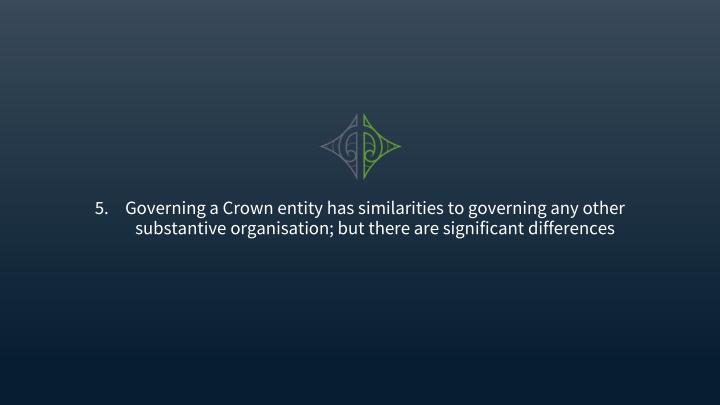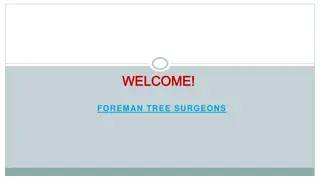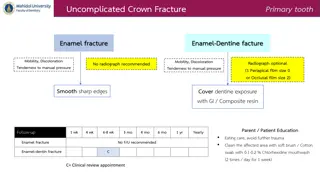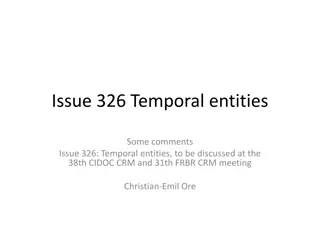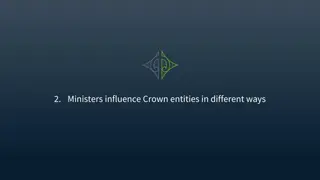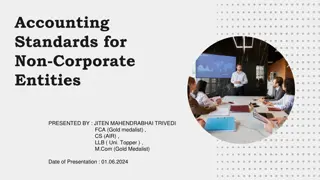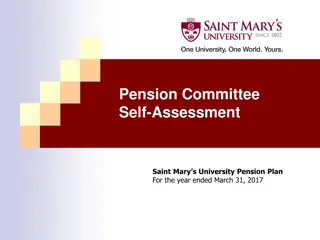Best Practices in Governance for Crown Entities
Managing a Crown entity involves unique governance challenges and responsibilities. Crown entity boards play a crucial role in setting strategic direction, overseeing performance, managing risk, and ensuring compliance. Upholding high standards of governance effectiveness is essential, with emphasis on performance management, corporate governance, and employment relationships. Board members must demonstrate collective responsibility, speak with one voice, and conduct regular assessments of their effectiveness. Additionally, board fees are set based on role complexities and responsibilities.
Uploaded on Nov 24, 2024 | 0 Views
Download Presentation

Please find below an Image/Link to download the presentation.
The content on the website is provided AS IS for your information and personal use only. It may not be sold, licensed, or shared on other websites without obtaining consent from the author.If you encounter any issues during the download, it is possible that the publisher has removed the file from their server.
You are allowed to download the files provided on this website for personal or commercial use, subject to the condition that they are used lawfully. All files are the property of their respective owners.
The content on the website is provided AS IS for your information and personal use only. It may not be sold, licensed, or shared on other websites without obtaining consent from the author.
E N D
Presentation Transcript
5. Governing a Crown entity has similarities to governing any other substantive organisation; but there are significant differences
A Crown entity board: sets the entity s strategic direction and annual performance expectations, in consultation with the Minister exercises the entity s powers and functions itself or through delegation, empowering the chief executive (CE) and others to implement the board s policies appoints and oversees performance of the CE ensures the entity s functions are performed efficiently and effectively manages risk and ensures compliance provides assurance of financial responsibility maintains appropriate relationships with key stakeholders.
High standards of governance effectiveness require performance management Crown entity boards need to demonstrate the highest possible standards of corporate governance, and to know how their entity is performing and drive organisational performance. Boards have a high degree of control over their own processes and structures. Boards have collectiveresponsibility and need to speak with one voice , once a decision is taken. Boards should undertake regular assessments of their own effectiveness, which may include assessments of individual members as well as the board as a whole.
A Crown entity is guided in some aspects of its employment relationships A Crown entity board appoints the entity chief executive, and oversees their performance. There are some important differences from company board practices, e.g. Crown entity boards must obtain the Public Service Commissioner s consent on the terms and conditions of employment of the chief executive: prior to appointment; and when conditions of employment, including remuneration, are reviewed (include Tertiary Education Institutions and a small number of other statutory entities). Crown entities must act as good employers
Fees for board members Board fees for Crown agents and ACEs are set in the Cabinet Fees Framework and administered by the Public Service Commission fees@publicservice.govt.nz Fees are set at different levels according to the role, and responsibilities and complexities of the board duties https://dpmc.govt.nz/publications/co-19-1- fees-framework-members-appointed-bodies-which-crown-has-interest Exceptions are possible but require clear reasons, strong evidence and be agreed by the Minister and/or Cabinet depending on the level of increase proposed. The Remuneration Authority sets fees for ICE boards.
